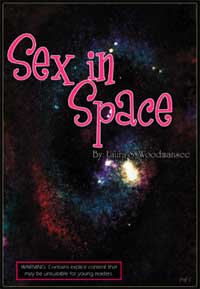Sex in Space: bizarre reactionsby Laura S. Woodmansee
|
| Apparently, some people just don’t understand that the book is intended to spark the public’s interest in space exploration, settlement, and tourism. |
Sex in Space was sold at NASA’s Jet Propulsion Laboratory (JPL) store for the first month after Apogee Books released the book. It was doing very well, so the store manager invited me to do a book signing. The trouble began as soon as a cheery book-signing announcement was emailed to all personnel at JPL. Unbeknownst to me, the store simply isn’t allowed to do book signings because JPL can’t be seen as endorsing a commercial product. The JPL store personnel simply made a mistake by booking my signing. However, what happened next is ridiculous. First, a liaison to the store e-mailed an announcement to all personnel—thousands of people at JPL—citing “ethical reasons” for the cancellation of the signing. This, of course, prompted many people to contact me to ask exactly what it was that I did wrong. The implication is that I did something unethical. I’ve done nothing wrong, which the JPLers involved have assured me of via several telephone conversations. A simple clarification sent to the same distribution list (all personnel) as the previous announcement would have fixed things. To date, no such email has been sent. Second, those involved ordered my Sex in Space books pulled from the store. Apparently the title “Sex in Space” is just too racy. Perhaps I should have titled my book, “The Possibilities of Human Reproduction Beyond Earth.” Oh, yes, the general public would have been so interested.
Unfortunately, my experience with JPL isn’t unique. My publishers told me that all of the other NASA centers, as well as several space museums, are unwilling to carry Sex in Space. These are the same stores that stock and restock my other two books, which are aimed at young women (Women Astronauts, and Women of Space: Cool Careers on the Final Frontier). Fortunately, regular bookstores are stocking Sex in Space.
In addition, I have been kicked off a space tourism discussion panel because the seminar sponsor, a conservative California space organization, doesn’t like the title of my new book. I wasn’t even asked what I would be presenting about on the panel. Anyone who knows me knows that I’m not one to discuss graphic details or use vulgar language. I’m not that kind of journalist—or woman, for that matter.
In Sex in Space I cite other cases in the past where people—even NASA scientists and engineers—have received strong criticism, and were even silenced, for bringing up the topic of “sex” in the context of long-duration space missions. It’s an important topic that certain people and organizations are not willing to face. This reaction is childish and shortsighted.
| I’m a wife, a mother, and a concerned journalist who is trying to open people’s eyes to what is turning into a very serious problem of the not-so-distant future. |
I hope that my little book makes the people who are working on space exploration, settlement, and tourism really consider the consequences of the nature of humanity. Let’s face it, sex is the way we humans reproduce. The Universe created us to be this way. So I find it very sad that certain people feel they need to repress this natural part of being human.
I’m a wife, a mother, and a concerned journalist who is trying to open people’s eyes to what is turning into a very serious problem of the not-so-distant future. To ignore the sexual and reproductive issues surrounding people in space will not make them go away. Future long-duration space missions and the possibility of space tourist couples in the next decade make the topic more urgent than ever. My fear is that the first serious look at sex in space will occur when birth control fails (because drug absorption in space is less, or maybe fluids behave differently in space) and we have a radiated fetus in space in danger of having horrific birth defects. Now is the time to study the sex in space topic seriously and shed our Puritanical ignorance.
